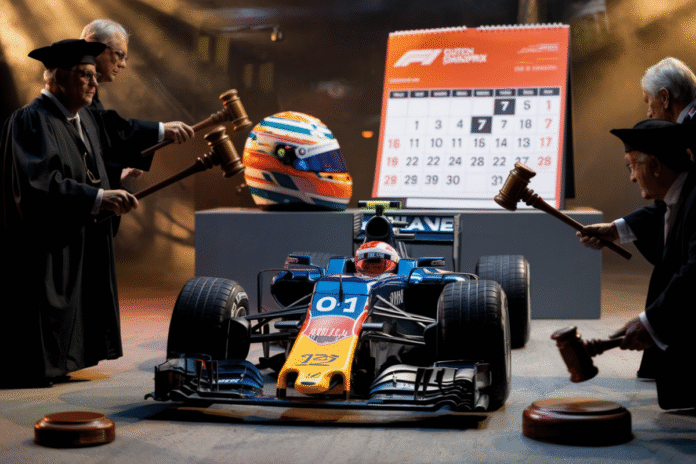The world of motorsport is no stranger to controversy, and recent developments surrounding a notable penalty have intensified the scrutiny. This week, Williams Racing is poised to formally contest the penalty imposed on Carlos Sainz during the Dutch Grand Prix. The FIA’s decision to hold a review hearing on Friday has raised eyebrows, as it presents an opportunity for the team to challenge the ruling that could have significant implications for the championship standings. With stakes this high, the outcome may not only affect Sainz’s season but also the competitive landscape of Formula 1.
As the motorsport community awaits the hearing, various opinions circulate regarding the fairness and consistency of penalties in the sport. The incident in question has sparked debates about the criteria used by race stewards to enforce rules. Williams Racing’s challenge is not merely about one penalty; it reflects broader concerns over how decisions are made and the potential for bias. The implications of this case extend beyond Sainz, as it could set a precedent for future rulings, making this hearing a pivotal moment in the ongoing narrative of the Formula 1 season.
The Context of the Penalty
The penalty imposed on Carlos Sainz during the Dutch Grand Prix stemmed from an incident that many believe warrants closer examination. Sainz, driving for Ferrari, faced a five-second penalty for an alleged infringement during a crucial phase of the race. This ruling has become a focal point for discussions about the consistency of officiating in Formula 1, as similar incidents have yielded varying outcomes in the past. The challenge by Williams Racing aims to highlight these discrepancies, questioning whether Sainz’s penalty was justified.
In the world of competitive racing, every decision made by officials can drastically alter the course of a race. In this case, Sainz’s penalty not only affected his position but also had ramifications for the championship standings. The FIA’s review hearing will delve into the specifics of the incident, examining race footage and stewards’ reports to determine if the penalty was warranted. The stakes are high, as a successful challenge could see the penalty overturned, allowing Sainz to regain lost points and potentially influence the championship race.
This situation underscores a critical issue in motorsport: the need for transparency and consistency in decision-making. As teams and drivers navigate the complexities of racing regulations, the FIA’s handling of penalties will be scrutinized closely. The outcome of this hearing could lead to calls for reforms in how penalties are assessed, ensuring that all competitors are held to the same standards.
The Implications for Williams Racing
For Williams Racing, the challenge against Sainz’s penalty is not just a matter of principle; it represents a strategic move in a highly competitive environment. The team has been striving to improve its performance in recent seasons, and any advantage gained through a successful appeal could be pivotal in their quest for points. By contesting the penalty, Williams is positioning itself as a proactive participant in the ongoing dialogue about fairness in racing.
The potential outcomes of the hearing could have far-reaching effects on Williams’s standing in the championship. If the penalty is overturned, it would not only benefit Sainz but could also enhance Williams’s reputation as a team willing to stand up for what it believes is right. Conversely, a ruling in favor of the FIA could reinforce the current penalty structure, leaving Williams to reassess its strategies moving forward.
This situation highlights the delicate balance between competition and governance in Formula 1. As teams like Williams seek to carve out their place in the sport, they must navigate the complexities of racing regulations while advocating for fairness. The outcome of this hearing will serve as a litmus test for the FIA’s commitment to transparency and equity in officiating.
The Broader Impact on Formula 1
The impending hearing is poised to resonate beyond the immediate circumstances of Sainz and Williams Racing. It raises fundamental questions about the governance of Formula 1 and the role of stewards in enforcing race regulations. As the sport evolves, the need for consistent and fair officiating becomes increasingly critical, especially in a landscape where every point counts toward championship standings.
Fans and analysts alike are closely monitoring this situation, as it could influence how future penalties are adjudicated. The FIA’s decision-making process is under the microscope, with stakeholders advocating for a more transparent approach to penalties. The outcome of the hearing could serve as a precedent, shaping the expectations of teams and drivers regarding the enforcement of rules.
Furthermore, the incident has sparked a broader conversation about the need for reform within the sport. As Formula 1 continues to attract a global audience, ensuring that the integrity of racing is upheld is paramount. The hearing will not only address the specifics of Sainz’s penalty but also highlight the importance of maintaining trust in the sport’s governing body.
Looking Ahead: the Future of Penalties in Formula 1
The upcoming review hearing represents a critical juncture for Formula 1, as it navigates the complexities of officiating and governance. The implications of this case extend beyond the immediate participants, potentially influencing how penalties are assessed and enforced in the future. As teams and drivers advocate for fairness, the FIA faces the challenge of maintaining credibility while enforcing regulations.
As the motorsport community anticipates the outcome, discussions surrounding the need for reform are gaining momentum. Stakeholders are calling for a reevaluation of how penalties are determined, emphasizing the importance of consistency and transparency. This hearing could catalyze significant changes in the sport, ensuring that all competitors are treated equitably and that their performances are judged fairly.
The dialogue initiated by this case may lead to a reexamination of existing regulations, with the potential for new guidelines that enhance the clarity and fairness of officiating. As Formula 1 continues to evolve, the lessons learned from this hearing will be crucial in shaping the future of the sport, ensuring that it remains a competitive and respected arena for all involved.


